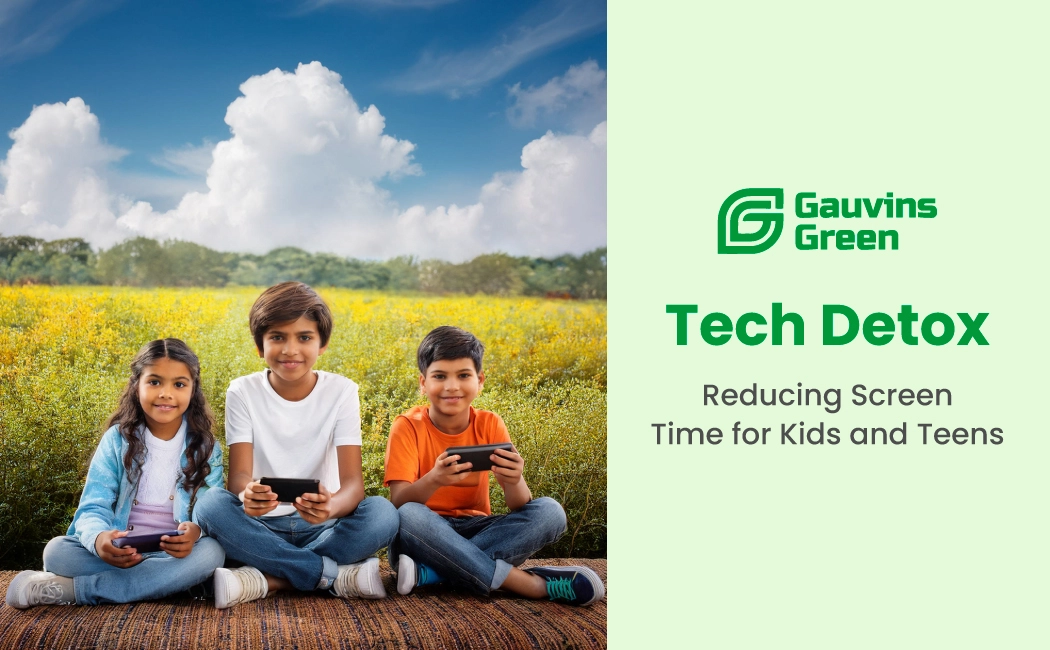Technology is a part of daily life in the 21st century; these children and youths, are growing up with digital technology surrounding them from smartphones and tablets to gaming and computer screens. Technology is good, but too much exposure of young minds to screens has serious negative effects. This is when the tech detox comes in to rescue one from such disparities—to balance the usage of technology and have healthier habits. In this blog, we delve into how such a tech detox reduces screen time for kids and teens, what it offers, and how strategies by Gauvins Green can help in the successful implementation and maintenance of the same. We will also touch on the importance of e-waste responsibility in that reduction of screen time often leads to more responsible recycling management and e-waste disposal practices.
What is Tech Detox?
A technology detox is an intended period to stay off everything digital to reduce the negative consequences of overexposure to screens. It’s all about keeping that good relationship with tech and establishing a few boundaries so one’s mind and body can retreat from the constant stimulation that seems to rule our lives. This may be very important for those kids and teenagers who always tend to stay into their gadgets, whether for entertainment, socializing, or even academic purposes.
Understanding Screen Time and Its Impact
Screen time is the amount of time one spends using screens, which includes television, computers, phones, and tablets. Although moderate screen time is okay as a form of learning and entertainment, excessive use leads to a couple of problems in health. Some of these health problems include:
- Physical Health Problems: Overuse of screen time results in inactive physical activities hence an increase in obesity, eye strain, and sleep deprivation.
- Mental Health: Children and adolescents suffer from anxiety, depression, and issues with attention due to excessive screen time.
- Social Skill Development: Excessive screen time might obstruct the training of necessary social skills, as it reduces face-to-face contact.
It is only through understanding the effects of screen time that one realizes the need for a technological detox. These effects can be mitigated by cutting back on screen time and encouraging physical and social activities amongst kids and teenagers.
Benefits of a Tech Detox
Digital/Tech detox has a lot of benefits, particularly for children and teenagers who are prone to misuse electronic gadgets. Some of them include:
- Better Sleep Habits: Reduced screen time, especially just before bedtime, improves the quality of sleep and regulates sleep patterns.
- Improved Focus and Concentration: Allowing the brain time off screens helps to promote better focus and concentration in school and other activities.
- Improved Physical Health: More tech detox promotes more physical activity and reduces the chances of obesity and other health-related problems that arise due to a sedentary lifestyle.
- Strong Social Connections: Time spent away from screens is time spent with people, so this may enhance the strength of social skills and relationships among kids and teenagers.
- Lower Accumulation of E-Waste: Lower screen exposure means decreased frequencies of buying electronic devices, which automatically results in better e-waste management, due to low accumulation.
These are all strong reasons why a tech detox is needed in young lives. But a tech detox is easier said than done. This is where Gauvins Green’s strategies are helpful.
Gauvins Green Strategies for Implementing a Tech Detox
Gauvins Green believes in sustainability and promotes best practices like e-waste disposal and recycling management. Assisting parents and educators in managing kid and teen tech detox, Gauvins Green employs the following methods:
- Putting Clear Tech Boundaries: Make clear when and when not to use various types of technology. More specifically, Gauvins Green refers to a family tech policy that can be used to limit screen time during mealtimes, about-to-sleep times, and when executing any family-related functions.
- Encouraging Alternative Activities: Cultivate interests that are screen-free—reading, outdoor play, or hobbies. Gauvins Green encourages families to discover the categories of activities that enhance creativity, physical fitness, and socialization.
- Leading by Example: Parents or guardians play a critical role in becoming a model for healthy tech use. Gauvins Green reiterates that adults should also do tech detox as they set an example and appreciate the time spent screen-free.
- Organizing Tech-Free Challenges: Gauvins Green suggests some tech-free challenges that a family or classroom can organize in which it commits to having a day or a weekend not using technology. The user will understand how this experience is, and this is for children and adolescents.
- Creating Tech-Free Zones: For instance, designating some parts of a home as tech-free zones can help minimize the time spent on screens and thus lead to meaningful interactions.
By doing this, Gauvins Green helps families and educators administer screen time effectively, promoting healthier habits and better e-waste management practices.
Gauvins Green Challenges of a Tech Detox
While the benefits of a tech detox are clear, implementing one can be challenging. Common issues include:
- Kids and Teens Push Back: Young people may resist a tech detox if they’re used to heavy device use. Gauvins Green suggests gradually reducing screen time instead of going ‘cold turkey.’
- Balancing Screen Time with Educational Needs: Cutting down on screen time while meeting digital learning requirements is tough. Gauvins Green advises focusing on reducing non-essential screen time, like entertainment.
- Consistency: Maintaining a tech detox can be hard for busy families. Gauvins Green recommends regularly reviewing and adjusting tech detox plans to keep them effective.
- E-Waste Disposal: As families reduce device use, responsibly disposing of old gadgets can be challenging. Gauvins Green offers e-waste disposal and recycling services to help.
By addressing these challenges, Gauvins Green helps families successfully implement a tech detox and enjoy its long-term benefits.
Long-Term Success and Maintenance
Here are some ways to stay successful in a tech/digital detox for the long haul: You can support new habits and keep changing with how things are going.
- Regular Reviews: Evaluate screen-time habits at intervals and adjust them as needed to ensure a balance that maintains health.
- Involve the Family: Tech detox should be a family goal. Everyone needs to establish goals and routines that will be carried out without technology.
- Celebrate Progress: Let positive changes and improvements achieved through the tech detox be acknowledged and celebrated to keep motivated.
Conclusion
Limiting screen time and fostering healthier habits for kids and teenagers is a real value in a tech detox. Understanding the impact of excessive screen time and providing effective strategies for families, such as those provided by Gauvins Green, ensures improved physical health, better sleep, quality family time, and more. A tech detox can mean a more balanced and full life, making children and teenagers achieve better in personal and academic spheres.
FAQs
What is Digital/Tech Detox?
Digital/Tech Detox is a deliberate break from digital devices to reduce stress, improve well-being, and regain balance in life.
How long should a tech detox last?
The duration of a digital/tech detox can vary. It could be a few hours a day, a full day each week, or a longer period, depending on individual needs and goals.
What are some tech-free activities for kids?
Tech-free activities include playing outside, reading books, drawing or painting, and engaging in board games or puzzles.
How can I encourage my child to participate in a tech detox?
Explain the benefits of a digital/tech detox, involve them in setting screen time limits, and offer engaging offline alternatives to make the transition easier.



